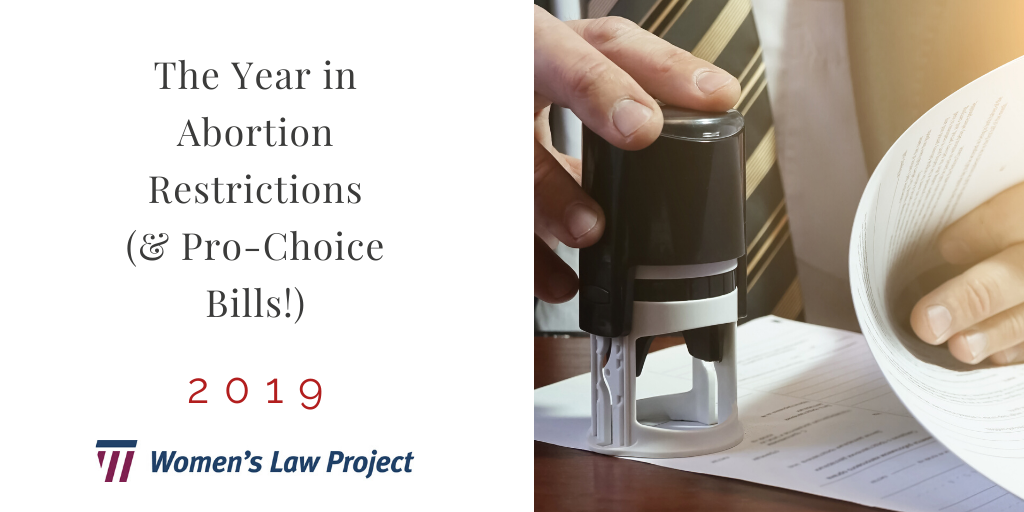
In 2019, anti-choice state legislators raced to enact an unprecedented wave of bans limiting abortion access in the United States. According to a new report, at least 25 new abortion bans will be signed into law by the end of the year.
Six states already have only one abortion provider left. Next March, the U.S. Supreme Court will hear arguments in June Medical Services v. Gee, the next big abortion rights case. WLP filed an amicus brief in this case you can read about here.
The Pennsylvania Legislature is stacked with anti-abortion lawmakers in leadership. This fall, anti-choice lawmakers exploited their legislative power to try to deprive Pennsylvanians with low incomes, pregnancy complications, and/or rural hometowns of their constitutional rights by advancing five targeted anti-abortion restrictions.
Here’s an overview of those restrictions and actions you can take to help protect the rights and health of Pennsylvanians:
HB 1890: It’s not often a state bill “goes viral” for being so ill-informed and cruel, but this one did. This bill would force a massive structural change for all hospitals and healthcare facilities by mandating doctors who work in any healthcare facility in Pennsylvania to collect pregnancy tissue from any stage of pregnancy, from both abortion and miscarriage, and have it buried or cremated, no matter the personal or religious beliefs of the patient. Patients who do not share the beliefs of the politicians supporting this effort would be financially penalized at an unspecified cost. Doctors who fail to comply would face a fine or jail time. Since filing a death certificate with the state is necessary to meet his mandate, this bill empowers the state to create a registry of abortion and miscarriage in Pennsylvania.
Status: Passed the Pennsylvania House. HB 1890 is now in the Senate Health and Human Services Committee.
Action: Contact members of the Senate Health and Human Services Committee and your state Senator and urge them to OPPOSE HB 1890.
HB 1977: This near-total abortion ban is intended to deprive all Pennsylvanians of their right to safe legal abortion. It is blatantly unconstitutional.
Status: HB 1977 is in the state Health Committee.
Action: Contact members of the House Health Committee and your state House representative and urge them to OPPOSE HB 1977.
HB 1058: This bill targets families with complicated pregnancies. It initially sought to force doctors to refuse to answer their patients’ questions for 24 hours after giving a patient a catastrophic medical diagnosis of an unviable pregnancy. The gag order was removed. However, this bill seeks to sneakily redefine “abortion” in Pennsylvania law.
Status: HB 1058 passed the House 116 – 76. It is now in the Senate Health and Human Services Committee.
Action: Urge members of the Senate Health and Human Services Committee and your state Senator to OPPOSE HB 1058.
SB 857: This much-needed bill was developed to improve healthcare access to rural communities across Pennsylvania. Twenty-seven percent of our population lives in areas designated as rural, and 48 out of our 67 counties are considered rural. The future of the bill is now imperiled because Pennsylvania’s radical anti-abortion lawmakers sabotaged it with an amendment designed to reduce access to medical abortion for rural Pennsylvanians.
Status: SB 857 passed the Senate and House. Since it was amended in the House, the Senate needs to vote again and can amend.
Action: Contact your state Senator and urge them to remove the anti-abortion amendment.
HB 321: This bill targeted Pennsylvanians with complex prenatal diagnoses—right now, defined specifically as a prenatal diagnosis of Down syndrome—for deprivation of their constitutional rights.
Status: Governor Tom Wolf vetoed this bill.
Action: Thank Governor Wolf for protecting Pennsylvanians from even more government over-reach into doctor’s offices via email, or publicly via twitter and Facebook.
Guttmacher’s report notes two interesting trends in abortion-access rights and policy. The first is that the anti-abortion movement has shifted strategy. After years of focusing on incremental barriers to abortion access meant to cumulatively restrict overall access to abortion for low-income and rural Americans, they have shifted into abortion restrictions and bans that are more straightforward about their intention of reserving abortion access for relatively privileged Americans who can afford to travel further and take more time off work to obtain safe legal abortion care.
There is also good news: more abortion protections have been passed this year than in the previous decade.
From the report:
In direct response to efforts to undermine abortion access in other states and the courts, state legislatures primarily in the Northeast and West, along with Illinois, are moving in the opposite direction. These legislatures have enacted policies that protect abortion rights and expand access to contraceptive services and sex education. This year, 36 measures that protect abortion have been enacted, along with 46 policies intended to decrease maternal mortality, 13 that increase access to contraceptive coverage and 17 that improve sex education.
Pennsylvania, of course, is an outlier in the northeast. We have many equality champions in the Legislature, but their efforts are often blocked by leadership. The long list of much-needed legislation that has been blocked includes fixing the state’s equal pay law, meaningful policy reforms to address sexual harassment, basic anti-discrimination protections for pregnant workers, and legislation to reduce infant mortality by protecting nursing workers’ ability to pump milk in a private sanitary place while at work.
Here’s to a better 2020.
The Women’s Law Project is a public interest law center devoted to defending and expanding the rights of women, girls, and LGBTQ people in Pennsylvania and beyond.
Sign up for WLP’s Action Alerts. Stay up to date on issues and policy by following us on twitter liking us on Facebook and following us on Instagram.
We are a non-profit organization. Please consider supporting equal rights for women and girls by making a one-time donation or scheduling a monthly contribution.


